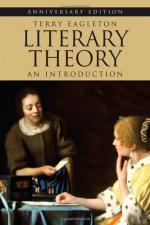
|
| Name: _________________________ | Period: ___________________ |
This quiz consists of 5 multiple choice and 5 short answer questions through Chapter 3, Structuralism and Semiotics.
Multiple Choice Questions
1. During the Romantic period, how is literature more than "idle escapism"?
(a) It is the acceptance of totalarian values rejected in English society.
(b) It is the celebration of totalarian values enforced in English society.
(c) It is the rejection of creative values celebrated in English society.
(d) It is the affirmation of creative values expunged from English society.
2. From a structuralist perspective, why could literature could no longer claim to be a unique discourse?
(a) Because structures could not be found in literature.
(b) Because structures placed a hierarchy on texts other than literature.
(c) Because structures could be found in all texts.
(d) Because structures considered literature a base form of discourse.
3. What is the name of the critic from the Constance school of reception aesthetics and the author of "The Act of Reading" who Eagleton discusses at length?
(a) Jean Paul Sartre.
(b) Roman Ingarden.
(c) Wolfgang Iser.
(d) Roland Barthes.
4. The distinction between fact and fiction in defining literature is what?
(a) Complicated.
(b) Questionable.
(c) Difficult.
(d) Important.
5. Who silenced the Russian formalists, according to Eagleton?
(a) Socialists.
(b) Liberals.
(c) Bolsheviks.
(d) Stalinists.
Short Answer Questions
1. According to Eagleton, structuralism maintains that "individual units of any system have meaning only by virtue of" what?
2. What is the name of the American hermeneuticist E.D. Hirsch Jr.'s famous 1967 book?
3. Eagleton writes that "New Criticism was the ideology of an ________, _______intelligentsia who reinvented in literature what they could not locate in reality."
4. Who was glad to abandon the "feminine vagaries of literature" in favor of penning war propaganda?
5. Eagleton argues that a literary work in Romantic society becomes what rather than rational and mechanical?
|
This section contains 307 words (approx. 2 pages at 300 words per page) |

|




